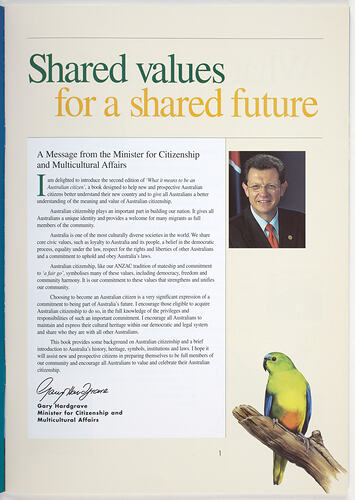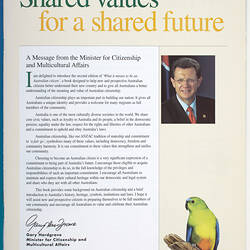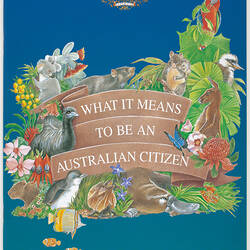Summary
Colour Booklet titled 'What it Means to be an Australian Citizen', it is part of the 'Australian Citizenship' information and promotional kit issued by The Department of Citizenship and Multicultural Affairs, Canberra in 2003. The kit emphasises the need for Australian citizens to have a shared vision and commitment to the future of Australia, and highlights the common values and aspirations of Australian citizens. This kit represents the continued desire to encourage migrants to take out citizenship as well as a new trend towards affirmation - existing citizens reaffirming their national allegiances.
Physical Description
Full colour 28 page booklet 'What it Means to be an Australian Citizen'. The front cover has a blue/ green background and the title appears within a three tier banner that is surrounded by illustrations of Australian flora and fauna including a Koala, Possum, Protea and Wombat, amongst others.
Significance
Issues of nationhood, national identity and citizenship have long been inextricably connected to discussions about migration. Since the nineteenth century and the evolution of notions of who should define and compose the Australian population - from the Australian Natives Association to the implementers of the White Australia Policy to multiculturalism - Australians have grappled with the question of identity. Colonial processes of naturalization were in effect as far back as the 1850s and after World War II there was a great deal of activity surrounding the naturalization of the waves of new migrants as well as annual citizenship conventions discussing related issues.
The debate continues today and this kit represents the continued contemporary desire to encourage migrants to take out citizenship as well as a new trend towards affirmation - existing citizens reaffirming their national allegiances. This may be interpreted within a current environment of national security fears and a desire to engender a politically inspired national unity. Like the community movements of the 1950s (such as the Good Neighbour movement), there is also a desire to encourage participation and initiatives at a community level with the calls for community citizenship and affirmation events.
More Information
-
Collecting Areas
-
Acquisition Information
Donation from Department of Citizenship and Multicultural Affairs, 14 Sep 2003
-
Issued By
Department of Citizenship and Multicultural Affairs, Canberra, Australia, 2003
-
Place & Date Used
-
Inscriptions
'AUSTRALIA/ WHAT IT MEANS TO BE AN AUSTRALIAN CITIZEN/ DIMIA/ Department of Immigration and Multicultural and Indigenous Affairs' '(C) Commonwealth of Australia 1997/ ISBN 0-642-28387-7/ Reprinted 2002...' 'Shared Values for a shared future/ A Message from the Minister for Citizenship and Multicultural Affairs/ I am delighted to introduce the second edition of 'What it means to be an Australian citizen', a book designed to help new and prospective Australian citizens...'
-
Classification
-
Category
-
Discipline
-
Type of item
-
Object Measurements
29.8 cm (Length), 21 cm (Width)
-
Keywords
Citizenship, Immigration, Immigration Policies, National Identity, Nationalism


